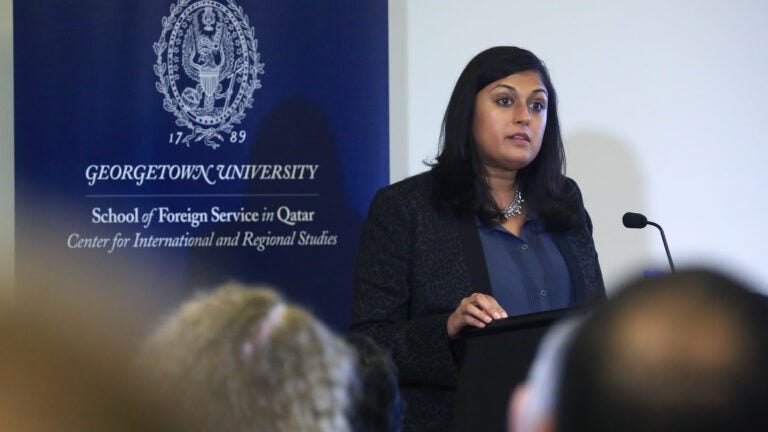Dialogue Series, Regional Studies
Neha Vora on "Impossible Citizens: Dubai's Indian Diaspora"

On December 1, 2014, Neha Vora, Assistant Professor of Anthropology at Lafayette College, delivered a CIRS Monthly Dialogue on the topic “Impossible Citizens: Dubai’s Indian Diaspora.” Much of the research she conducted was during the “boom” years of Dubai’s economic growth, when “Brand Dubai” was establishing the city as a commercial and tourism hub to attract international attention and investment. During this period, “the landscape of Dubai was shifting drastically […] moving away from the older South-Asian dominated downtown neighborhoods around the Dubai Creek […] and away from older forms of mercantalism and maritime trade,” towards a more corporate, westernized, and multinational capitalist enterprise.
The thrust of Vora’s research questioned the paradox of how the middle-class Indian communities of Dubai have a strong sense of belonging even though there are no certain paths to citizenship or permanent residence. “Indians have practically zero access to any form of permanency in Dubai. They cannot naturalize, or even gain permanent residency” due to the Kafala system that ties people to their employment visas and sponsors, Vora explained. Such a sense of belonging, she argued, occurs through “substantive,” or “unofficial” ideas of community that are not based on the technicalities of citizenship, but, rather on strong senses of historical and cultural affiliation. Because of the historical mercantile and cultural connections, many Indians see the Gulf states as an extension of India and not necessarily as a separate geographical and cultural entity. Indians in Dubai have access to the familiar signs of home including language, food, clothing, and cultural practices and trends.
Debunking the idea that migrants to the Gulf desire assimilation and citizenship, Vora argued that many of the middle-class Indian residents of Dubai see themselves as having temporary economic goals, which, once achieved, signal their return to the homeland. In an anthropological vignette, Vora introduced the audience to Rohit, one of her interlocutors and an architect and long-term Indian resident of Dubai. Even though he has lived for over three decades in Dubai, and it is where his children were born and raised, he still considers himself a temporary economic migrant. Describing Dubai as “an air-conditioned bus” that offers comfort, but is always in transit and thus an unstable place of residence, “Rohit in many ways exemplifies the Indian middle-class dream in Dubai. He had managed to accumulate wealth during his time in the Gulf, had improved the living conditions of his extended and immediate family, and was setting himself up for a comfortable retirement in India,” Vora reported. For many middle-class Indians, such as Rohit, expatriation to the Gulf states is seen as a sign of status and perceived as a privilege, but one that can be terminated at any time. Thus, economic migrants have adapted to feeling simultaneously settled and yet always transient.
Importantly, the middle-class Indian business communities of Dubai see themselves as actively contributing to local economic development and distinguish themselves from others who depend on state “welfare,” be they low-income South Asian laborers, Western expatriate professionals, or even local national beneficiaries of state subsidies. The middle-class Indians that Vora interviewed were keen to describe themselves as economic contributors to Dubai, and as “good self-enterprising foreign residents of the city, not bad welfare-reliant citizens,” she said.
However, despite many describing themselves as purely economic migrants with no desire for ties to the state, the majority of Indian businesspeople and professionals do in fact actively contribute to, and replicate state policies. “Middle-class and elite South Asians, for example, espoused certain neoliberal market values and liberal ideas about citizenship, while participating in non-liberal forms of patronage and exploitation that reproduce social stratification and forms of hierarchical citizenship among the Indian diaspora in Dubai,” Vora argued. By establishing business operations and hiring workers under the Kafala system, they actively promote UAE government’s policies by reproducing local and legal norms.
Vora concluded by explaining that even though Dubai still largely retains its South Asian character, things are changing fast. In Dubai’s effort to modernize older Indian mercantile neighborhoods of the city, and to attract a more “westernized” client, “rents had gone up, formerly lower-middle-class neighborhoods were being turned into luxury apartments, and Indians felt less job security than ever before,” she said. This rapidly changing environment has served to further unsettle the Indian communities that have been living and working for generations in the older areas of Dubai.
Neha Vora’s research focuses on citizenship and belonging within the Gulf Arab states, particularly among South Asian diaspora populations. In addition to a number of journal articles, Vora is the author of Impossible Citizens: Dubai’s Indian Diaspora, was published in 2013 by Duke University Press. A recipient of multiple awards and fellowships, she is currently in Doha working on a project that investigates the impacts of knowledge economy transformation and American branch campus expansion on Qatar.
Article by Suzi Mirgani, Manager and Editor for CIRS Publications